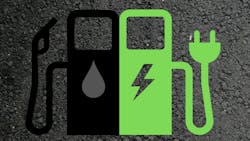The electric truck fleet takeover
In 2018, the Class 8 heavy duty truck and fleet industry sustained with its dialogue about the prospects of electrification of vehicles and where they compare against diesel counterparts. While electrification might grow into a possible reality down the road, many in the industry in the foreseeable future remain loyal to the improving output of quality returns found in diesel.
There is a plethora of reasons why electric trucks may continue to be on the back-burner when private transportation fleets and for-hire carriers are developing their truck procurement strategies. Items ranging from fuel economy, price of investment, range and charging station infrastructure are at the top of the list of apprehensions for fleet managers. In terms of electric or hydrogen fuel-cell trucks, only 4 percent of respondents said they are presently procuring these types of trucks, and 53 percent said they neither see the worth nor will they consider the technology for at least another ten years. Nearly a quarter of respondents (21 percent) also said they believe electric or hydrogen fuel-cell trucks will never be widely used for over-the-road operations. As for their reasons, 39 percent said they will not consider the technology because of limited fueling or charging station infrastructure; and 33 percent have concerns over the vehicle’s range or distance.
Many of those in charge of procuring trucks are still uncertain of alternative fuel technology since they do not know if the driving results will be as predictable as diesel.
In fact, in a recent industry benchmark survey, fuel economy ranked second (37 percent) as a top instigator overall for truck replacement. This is especially important since 86 percent said they’ve experienced a consistent increase in fuel economy in model years 2013 through 2018. This perspective is further underscored by the fact that the recent price of diesel has increased above what industry forecasts projected. According to the latest North American Council for Freight Efficiency (NACFE) and its 2018 Annual Fleet Fuel Study, diesel recently increased to $3.28 per gallon, surpassing its projection of reaching just $2.72 in 2018.
Advocates of electrification point to the technology’s environmental benefits. However, many don’t fully realize the substantial gains diesel has made in these areas as well. Private fleets and for-hire organizations understand these benefits when they upgrade to the latest truck equipment available. An analysis of Class 8 truck utilization from Fleet Advantage saw that these companies can realize a first-year savings of $26,687 when upgrading from a 2012 sleeper model-year truck to a 2019 model (based on diesel prices at $3.29). This represents a 15.5 percent increase in savings compared with a similar analysis a year ago upgrading to a 2018 model when diesel prices registered $2.57.
In addition to understanding considerably better cost savings from fuel economy gains, fleets will also achieve an estimated 18 percent reduction in CO2 emissions and 46 percent reduction in NOx output when upgrading from a 2012 model-year sleeper to a new 2019 unit.
To view a "all in" cost comparison cart of sleeper models, click through the media gallery above.
The industry will continue to assess electrification as a possible asset for the transport of goods in support of the economy – and they should take a hard look. However, the data continues to support diesel as the prime option for transportation, as newer truck technology makes great strides in improving fuel economy and lowering emissions. Coupled with lifecycle asset management strategies that leverage flexible lease models that help reduce the total cost of ownership and help upgrade into newer technology every three-to-four years, diesel will remain the most economically feasible option for the foreseeable future.
This VSP.com online exclusive was provided by Brian Holland, president and CFO at Fleet Advantage, a truck fleet business analytics,equipment financing and lifecycle cost management company.
